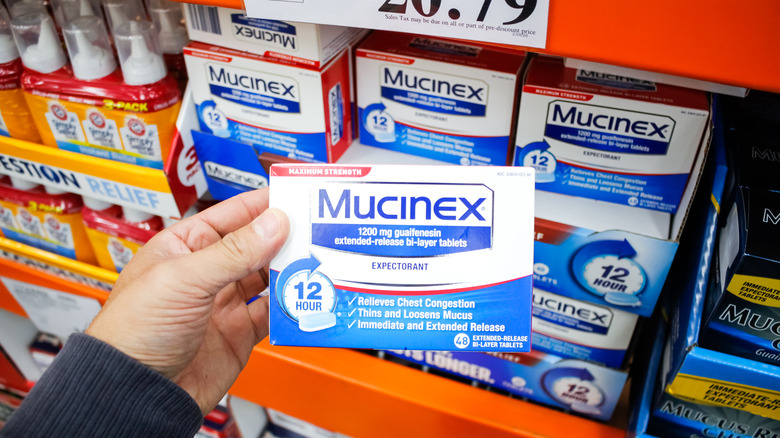Is It Safe To Take Mucinex When Breastfeeding?
As winter sets in, you might face a new set of health challenges if you're pregnant. With a body already undergoing significant changes, the additional strain of colder temperatures can have a profound impact. According to a 2020 study published in the journal Frontiers in Immunology, pregnant women generally face an increased risk of infections. This risk of infections also increases with colder weather — since respiratory illnesses happen more often during winter, per Johns Hopkins Medicine, due to factors such as increased time spent indoors. This is when medications like Mucinex come in handy.
According to Healthline, Mucinex helps alleviate symptoms of chest congestion where excessive mucus production is present. The active ingredient in Mucinex, guaifenesin, is an expectorant that works by thinning and loosening mucus in the lungs and airways, making it easier to cough up, says WebMD. Although many people use Mucinex without any issues, it's vital for pregnant people to consult with their doctor before taking the medication. Those who are breastfeeding should also seek medical advice before taking Mucinex, as a doctor would be able to advise which formulations are safest to use and which should perhaps be avoided. Let's dig in further.
Can I take Mucinex when breastfeeding?
There are no reliable studies examining the safety of Mucinex during breastfeeding. Various sources deem it safe, while others warn against using it. According to the Breastfeeding Network, guaifenesin is usually compatible with breastfeeding. Drugs.com also reiterates this claim, adding that it's unlikely the presence of the medication in milk will harm the infant. However, Healthline also warns that Mucinex comes in different formulations containing other active ingredients, which may affect breastfeeding infants differently.
The two additional active ingredients are dextromethorphan and pseudoephedrine. Healthline notes that dextromethorphan's safety hasn't been studied much. As for pseudoephedrine, Healthline considers it generally safe. However, the National Health Service (NHS) doesn't recommend taking it while breastfeeding, warning that it may reduce breast milk volume. If unsure, it's always best to read the label carefully and discuss any concerns with your doctor. Generally speaking, breastfeeding mothers should use caution when taking any medication.
Mucinex types and dosage
As with many other medications, Mucinex is available in various formulations; however, information about the recommended dosage for breastfeeding mothers is limited — it's best to check with your doctor beforehand. The most common is the tablet form, which is available in two types: short-acting and extended-release. The recommended dosage for adults for the regular short-acting form is 200 to 400 mg every 4 hours, says the Mayo Clinic.
On the other hand, the extended-release tablet is designed to provide relief for up to 12 hours. According to Healthline, the extended-release tablets are available in 600 mg or 1,200 mg strengths. The recommended dosage for adults is 600-1,200 mg every 12 hours, per the Mayo Clinic. The medication is also available in liquid form, but the recommended Mucinex dosage varies depending on the strength of the solution. The recommended dosage for adults and children over 12 years old is 20 ml every 4 hours, per Mucinex.



